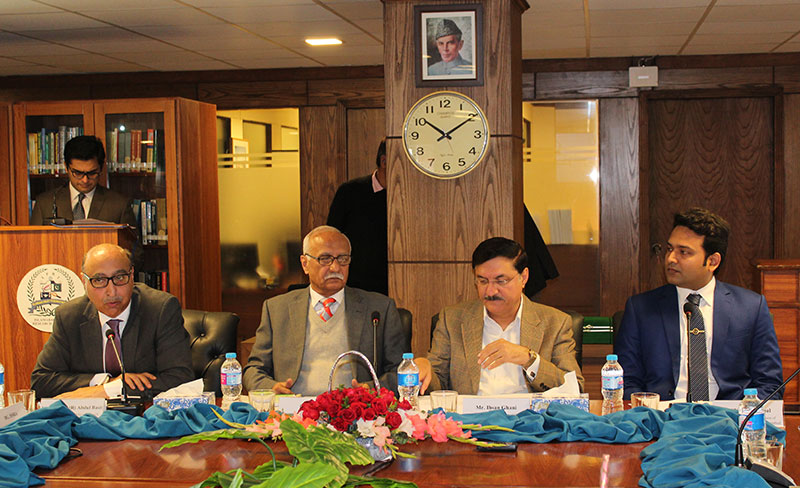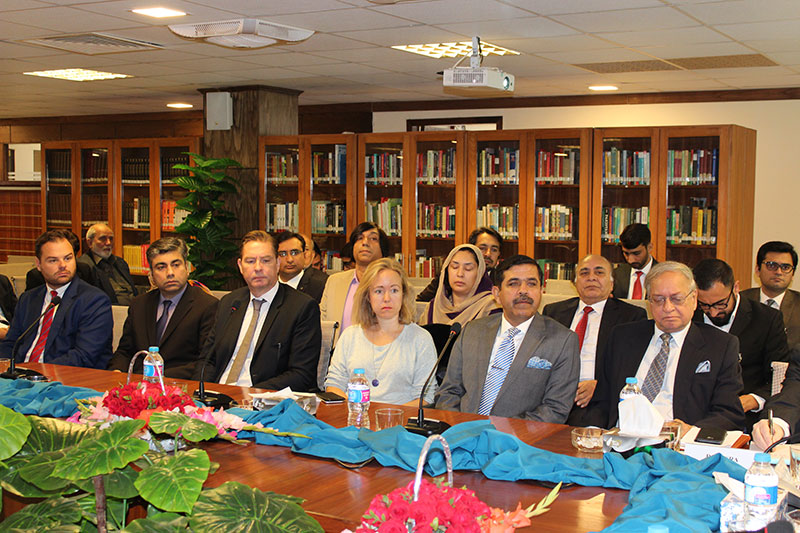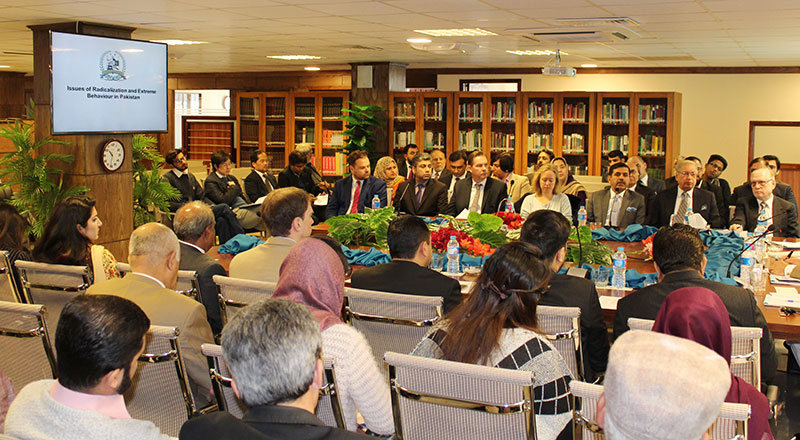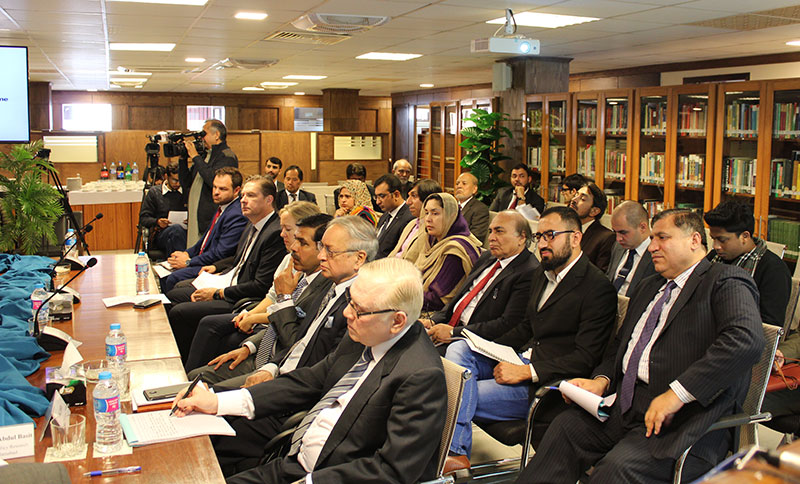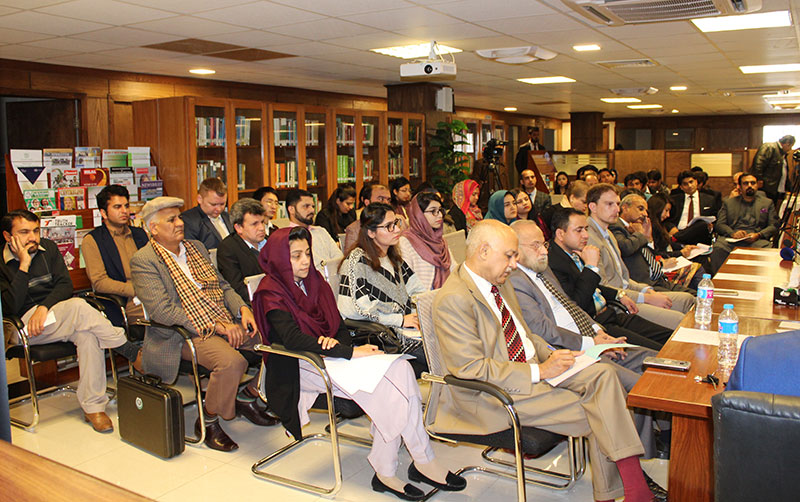National Confrence 10/02/2018
Post-event Report
One-day Conference
“Issues of Radicalization and Extreme Behaviours in Pakistan”
General:
A one-day conference titled “Issues of Radicalization and Extreme Behaviours in Pakistan” was organized by the Islamabad Policy Research Institute (IPRI) on January 30, 2018, at the IPRI conference hall, Islamabad. The conference consisted of one working session where two sub-themes, i.e. “Radicalization and Extreme Behaviours in Pakistan: Leading Causes” and “Pakistan’s Counter Radicalization Strategy: Lessons Learnt and Way Forward” came under discussion. Mr. Ihsan Ghani, National Coordinator of National Counter Terrorism Authority (NACTA), chaired the conference and gave a key-note speech on the subject. Two eminent speakers who talked on the sub-themes included Dr. Khurram Iqbal, Assistant Professor at National Defence University and Lt Gen (R) Masood Aslam. The conference was attended by students, academics, journalists, members of diplomatic missions in Islamabad, and former diplomats.
Concept Note
“To be radical is to be extreme, relative to something that is defined or accepted as normative, traditional, or valued as the status quo,” says a well-known author David Mandel. A radical is someone who believes in extreme social and political solutions that are not shared by a majority in a community. Radicalization and Extreme Behaviours (REB) can be the artefact of historic, political, economic and social settings of a particular area, also impacted by regional as well as global power politics.
Whether based on religious, ethnic, social or political grounds, these extremist ideologies oppose tolerance and diversity. In this sense, the reasons for radicalization can be diverse. International discourse has shown that REB grows in those countries that reveal the low level of literacy rate, the predominance of a national narrative based on ideology, feeble social solidity, bad governance, presence of criminal mafias, political instability, fragile institutions, and unequal income distribution among the populace.
In recent years, Pakistan has also been dealing with the menace of the REB. In Pakistan’s case, reasons for extremism range from economic inequalities to social injustices. There are also external drivers for REB, such as the ongoing conflict in Afghanistan, the looming Jammu and Kashmir dispute and the seemingly intractable turmoil in the Middle East.
In the aftermath of 9/11, US led NATO forces, mandated by the UNSC, undertook an offensive against the then Taliban government of Afghanistan in response to the refusal to hand over Osama-bin-Laden to the US. Pakistan could not insulate itself from the evolving situation on its Western border. Soon the country was found in the grip of an unprecedented violence. The emergence of Tehrik-i-Taliban Pakistan (TTP) at its control of the Swat Valley, imposing their radicalized version of Islam a la Talibanization of Afghanistan, had set alarm bells ringing. It was inevitable to deal with that threat.
The Pakistan military, mandated by the government, conducted operations in the areas of Swat and various parts of FATA to restore the writ of the state. These operations included 2007 Operation Rah-e-Haq, 2007-09 Operation Rah-e-Rast, 2009 Operation Sherdil and 2014 Operation Zarb-e-Azb. The army also undertook deradicalisation measures (Sabawoon Rehabilitation Centre). However, the National Action Plan (NAP) that was aimed to consolidate the gains achieved by operations “Zarb-e-Azb” and “Radd-ul-Fasaad” remains largely unimplemented. And, unless NAP is implemented in its entirety, Pakistan may not be able to deal with the issue of radicalization and extremism effectively.
It needs to be analysed as to what are the drivers of the REB in Pakistan; what is the main source of sustenance for radicalized behaviours in the society; how radicalized elements can be re-integrated into the society; what part can be played by relevant stakeholders to mitigate these issues at all levels of the spectrum; and what policy measures can be taken by the state to turn challenges into opportunities. To find answers to these questions, IPRI is organizing this one-day conference. IPRI trusts that the conference would come up with useful recommendations to deal with extremism in all its aspects.
Conference Proceedings
Ambassador (R) Abdul Basit, President IPRI, welcomed the distinguished speakers and participants in the conference. He said that it was the policy of IPRI to organize conferences on topics of national, regional, and international significance. Radicalization and extremism are serious issues faced by Pakistan. An open discussion can help in understanding these phenomena and their root causes and in charting a future course of action to rid Pakistan of these serious problems and make it a more tolerant and vibrant society.
Mr. Ihsan Ghani, in his keynote address, talked about the mandate of the National Counter Terrorism Authority (NACTA), which was to formulate policies and recommendations regarding extremism and terrorism. He said NACTA had made a ‘National Narrative’ to counter extremist ideology in society. The initial draft took 18 months to complete and had valuable input from academia, media and religious leaders. He added that radicalization and extremism are processes, not actions. They develop gradually. Such phenomena manifest in rigidity of thought and intolerance and at times lead to violent expression. These processes (radicalisation and extremism) are corollary of multiple factors. Thus, tackling them requires a holistic approach that goes beyond kinetic means. Issues of injustice, lack of service delivery, a dilapidated criminal justice system and an inequitable socio-political environment, equally contribute to the growth of intolerance and violent behaviour in society. He stated that the corrective measures and mitigating factors could possibly go a long way in helping eradicate radicalization and extremism in society. They, inter alia, include promotion of rule of law, an integrated set of education reforms, rehabilitation and reintegration of extremists and nurturing religious and interfaith harmony. He said that the role of media is vital in shaping a national discourse that cherishes the values of coexistence, tolerance and empathy, and discourages selective and twisted interpretation of Islam. He added that Media’s capacity to reach to a considerable segment of population amplified its importance and responsibility manifold. Besides this, a national narrative along such lines should be promoted by intellectuals and through the education system. A positively lasting outcome can only be brought when policies are owned and whole-heartedly implemented.
Dr. Khurram Iqbal, in his talk titled “Radicalization and Extreme Behaviours in Pakistan: Leading Causes” discussed the multiple causes of growing radicalization in Pakistani society. He explained that the radicalization is a process characterised for the use of violent means and strategies in political conflicts. It undermines ‘collective equilibrium thinking’ in society and leads to aggressive behaviour among the people. He added that radicalization is a multi-faceted phenomenon and its roots lay in various factors: nationalism, social exclusion, revenge, deprivation, psychological abnormalities and religious fundamentalism.
He remarked the discourse on extremism and radicalization is largely shaped by western scholars. They tend to over-emphasize on mono-causality and exclusively focus on Islam, as if the issues of extremism and radicalization are Islam-specific. Moreover, they rely on secondary sources and most of them have no academic background in terrorism and extremism studies. This calls for greater caution invoking their theories to understand violent behaviour in Pakistani society. Their theories hardly contribute in giving an insight into the militant landscape in Pakistan. He said that in Pakistan militancy manifested in different groups in various forms. There are ethno-nationalist groups like the Baloch Liberation Army (BLA) and Baloch Liberation Front (BLF), which fight for a separate state. Sectarian groups like Lashkar-i-Jhangvi and Ahl –I-Sunnat Wal Jamaat mobilize the element of sectarian identity for their interests and aspirations. Then there are groups that come under the rubric of the Neo-Taliban. They include Tehrik Taliban Pakistan, Al-Qaeda and Ansar-ul-Islam. They aim to radically transform the society in their vision, shaped by a narrow interpretation of Islam. Multiple factors contribute to the growth of these militant organizations and no single is sufficient to explain these phenomena.
Lt Gen (R) Massod Aslam talked about the growth of terrorist organizations in Pakistan and how they should be countered. He said the best way to cripple these organizations would be to deprive them of passive and active supporters by making society more resilient and inclusive. He highlighted that as long as the marshes on which extremist groups feed off were not dried up by Pakistan, there would be no lasting solution. Kinetic action helps in so far as it denies militants physical space and dismantles their networks, but issues of extremism and radicalization are processes , that gradually develop and solutions to them require a well thought-out and graduated response. He emphasized the urgent need of social reform in Pakistani society. Intolerance and violent expression of behaviours have broken the social fabric. Radical changes are needed in the criminal justice system. Political disenfranchisement, economic exclusion and social fissures provide militants with an opportune environment to nurture. He added that as long as these issues are not tackled, extremism and radicalization will blight Pakistani society. But tackling them requires political ownerships and the commitment to see the designed reforms through. He emphasised that the message should be crafted carefully and its dissemination should also be done in a proper manner to make the message credible enough.
Recommendations:
- Since radicalization in Pakistan is caused by both internal and external factors, therefore, it is important to address the internal and external dimensions of the issue. At the internal level, there is a need to enhance focus on soft approaches and the situations where counterterrorism operations are required, the collateral damage should be avoided. On the external front there is a need to find a regional solution to Afghanistan conundrum and devise a joint Sino-Pak stance on issues related to the use of proxy groups from India and extra-regional forces to fan terrorism.
- Radicalization is a process and can only be countered by continuous mechanisms, including soft-power as well as hard-power solution for de-radicalization.
- Inclusive growth strategies are very important to be promoted in society and the state should ensure provision of education in every part of the country to avoid proliferation of radicalisation tendencies.
- Government should not only eliminate the militant infrastructures, recruitment bases, but also support more vociferously mainstreaming some of the radical elements.
- Extremism and terrorism are caused by multiple factors such as bad governance, presence of criminal mafias, political instability, fragile institutions and unequal income distribution among the populace. In addition, some other factors like vengeance, poverty and religious fundamentalism are also contributing towards radiclisation at the individual and organizational Thus the single factor theories fall short of explaining cases of radicalisation in Pakistan. A multi-dimensional approach is required to deal with the menaces keeping in view all the aforementioned factors.
- The western definitions of radicalization are narrow and do not fit in Pakistan’s case since they consciously ignore geo-strategic aspects and overemphasis on so-called ‘Islamic Terrorism’.
- In order to counter radicalization in effect, the government needs to focus on education, health, rule of law, provision of speedy justice and creating more job
- The politico-social initiatives to de-radicalise the nation would not bear any fruit if there is no public support, political ownership and will to implement these initiatives.
- The diverse nature of the militant landscape in Pakistan demands different approaches. The militant landscape of Pakistan could not be pigeonholed since it was very diverse and included religious nationalist groups like Lashkar-e-Tayyeba, Jaish-e-Muhammad, Harkat-ul-Jihad-e-Islami and Al-Badar; as well as sectarian groups like Lashkar-e-Jhangvi, Sipah-e-Muhammad, Jundullah, Zaynaboon, and Ansar-ul-Islam; as well as ethno-nationalist groups.
- The government should not only eliminate the physical militant infrastructure, recruitment bases and recruiters, who support radical elements and militant violence, it should also support more vociferously mainstreaming some of the radical elements that are surrendering to the writ of the state. No doubt, this is risky, but a concerted and coherent policy with clearly defined lines must be put in place to mainstream the amenable as kinetic efforts alone cannot eliminate terrorism or extremism.
- There should be thorough profiling of the life trajectories and backgrounds of those involved in militancy.
- The area of Swat differs from other parts of the country. It has different characteristics and cultural outlook. The model adopted there should not be replicated in FATA or other parts of the country.
- Adopting and replicating models from other countries such as Sri Lanka, Turkey or the UK will not be fruitful, in the absence of linkages. There should be a strategy of taking advantage of the repatriated individuals from the pilot programmes who can act as messengers of de-radicalization in their local communities.
- The world needs to acknowledge that the spillover effects of the war in Afghanistan gave birth to a new breed of terrorist groups in the tribal areas of Pakistan. Inspired by al-Qaeda’s ideology, Tehrik-e-Taliban Pakistan (TTP) is at the pinnacle of this list. As long as there is not a negotiated settlement to the Afghan conflict, instability will endure in tribal areas of Pakistan.
- There needs to be a strong bond between the Pakistani state and its citizenry. Youth and the marginalized elements of society should be empowered and taken care of. Reforming educational sectors including both religious and contemporary education and instilling an environment of openness and coexistence is needed.
- There is an increased tendency of radicalization among Pakistan’s educated youth. It is important to trace its various drivers. It is not just lagging human development that can explain the state of radicalism among youth.
- The role of the state and its haphazard education policies have also created a politico-ideological environment that has impacted the outlook of the younger generation in problematic ways. To address the polarising potential of the education system, the state and civil society should prioritize initiatives that allow regular interaction and dialogue among students from various educational backgrounds.
- Pakistan should try to bring all provinces on board to develop a national counter-extremism narrative, and it should be supported by all the stakeholders.
- There is a need for media reforms and regulations keeping in view the fact that any change to media laws currently in force in the country will have to be linked to larger policy reforms, if they are to succeed. Trends can be changed, but policies would need to be gradually reformed.
- The weak judicial system is not because of ‘external factors’. Pointing fingers at ‘external factors’ is nothing more than shirking responsibilities. The most glaring causes that need to be revamped include outmoded court procedures and inefficient case management techniques.
- National Action Plan (NAP) was a set of guiding principles to counter extremist ideology and rid society of terrorism. However, there is a need to invest in structural reforms, instituting a parallel monitoring system.
- The mosque in Pakistan is now no longer just a religious institution. Instead, it has morphed into a deeply political one that seeks to radically transform culture and society. The state needs to regulate the institution of the mosque to neutralize bigotry and spread the correct interpretation of Islam.
Disclaimer: Views expressed are of the speakers and are not necessarily reflective of IPRI policy.


